ISBAD 2024: Hear from our Early Career Grant awardees

For this year's International Snakebite Awareness Day, taking place on 19 September 2024, we spoke to our Early Career Grant awardees about why they chose to conduct research into snakebite. Hear from them below.
Abebe Mengesha Aga
Research topic: Studies of service availability and treatment outcome among snakebite cases in Afar region, Ethiopia: A prospective cohort study
Wellcome grant awardee 2023
What is your research’s focus?
Snakebite cases in the Afar region of Ethiopia is high as climate and environmental factors play a significant role in snake behavior and human-snake interactions. The study aims to evaluate essential healthcare services for managing snakebites in the Afar region, identifying gaps that hinder effective treatment. This will assess access to medical facilities, services availability, and patient transport to healthcare centers while analyzing treatment outcomes, including recovery rates, complications, and mortality. The research will track snakebite patients over time, examining factors such as treatment timeliness, antivenom availability, snake type, and patient health. The findings will provide insights into local challenges and inform healthcare policies, leading to better resource allocation, training, and improved clinical guidelines for snakebite management in the region.
How did you first become interested in snakebite and its unique challenges?
My initial interest with snakebite research arose from the significant public health issues it poses in Ethiopia, particularly within rural and pastoral communities. Those who suffer from snakebites often face severe health risks, and the limited availability of antivenoms exacerbates the problem. Witnessing the hardships faced by victims and the lack of affordable, locally produced antivenom options motivated me to explore this area of research. I am driven by a desire to accurately assess the extent of this issue and to improve local antivenom production, which could enhance accessibility and ultimately save lives, reducing the impact of snakebites on vulnerable populations in Ethiopia and beyond.
How do you hope your research will impact snakebite patients?
This research could significantly enhance the management of snakebites in the Afar region by indicating gaps and improving the distribution of medical resources like antivenoms and healthcare services. These findings may drive improvements in healthcare infrastructure, staff training, and emergency transport, directly benefiting snakebite patients. By analyzing treatment outcomes, the study could promote the adoption of effective protocols, leading to reduced complications, faster recovery, and lower mortality rates. The research may also influence policy changes, standardize treatment protocols, and refine response plans. Additionally, it could raise community awareness, leading to early recognition of snakebite symptoms and prompt care, ultimately reducing mortality and long-term complications.
The research aims to identify shortages in snakebite treatment services, such as the availability of antivenoms, trained staff, essential medical supplies, and patient barriers like distance to health care and financial constraints. Addressing these gaps could enhance access to care for snakebite victims, and guide local and national authorities in resource allocation, ensuring high-risk areas are well-equipped for effective response. By analyzing treatment outcomes, the study could highlight effective protocols, leading to better practices and patient care by influencing health policies, guide the development of regional guidelines, and improve emergency response plans. The research may also boost public health campaigns, raising awareness of snakebite prevention and early treatment in the Afar region.
Dr Jacob Achumboro Ayang
Project title: Traditional and Conventional medicine practices in the management of snakebites: a special focus on the Upper East Region of Ghana
Wellcome grant awardee 2023
What is your research’s focus?
This research seeks to compare the knowledge of conventional and traditional healers on the treatment and management of snakebites with the WHO Guidelines for the management of snakebites, 2nd edition to elucidate any knowledge gaps. This will also allow for the prediction of mortality and morbidity linked to snakebites in the Upper East Region of Ghana. Ultimately, this research will contribute to a comprehensive understanding of snakebite prevalence, treatment practices, and associated morbidity and mortality in the region.
How did you first become interested in snakebite and its unique challenges?
My interest in snakebite research was ignited during fieldwork in the Upper East Region during an Anthrax outbreak, where I encountered the devastating impact of snakebites on rural communities. The stark contrast between the widespread occurrence of snakebites and the limited resources and knowledge available for treatment was deeply concerning. This firsthand experience highlighted the urgent need for research to address this neglected tropical disease and improve patient outcomes.
How do you hope your research will impact snakebite patients?
This research is expected to inform the development of effective strategies to reduce the burden of snakebites in the Upper East Region. By mapping the prevalence of snakebites and assessing the knowledge and practices of healthcare providers and traditional healers, I aim to identify critical areas for intervention. The findings will contribute to the development of evidence-based guidelines, improve access to anti-venom, and enhance training of healthcare workers. This research will help save lives and prevent disability caused by snakebites.
Yoshihiro Aoki
Project title: Factors associated with delayed hospital visit for snakebite in the Eastern Visayas, the Philippines: Exploring traditional remedies in the communities
Wellcome grant awardee 2023
What is your research’s focus?
Snakebite envenomation is a critical issue in the Philippines, with challenges such as limited access to timely medical care, insufficient antivenom supplies, and reliance on traditional remedies, especially in rural areas. My research in the Eastern Visayas region focuses on identifying prognostic factors associated with poor outcomes among snakebite patients by analyzing the causes of delayed hospital arrival. The study will explore the prevalent use of traditional remedies, as observed in my previous research in the region, and identify opportunities for improvement through educational interventions.
How did you first become interested in snakebite and its unique challenges?
I have always had a fascination with reptiles, and currently I keep a snake and a tortoise as pets. When I began my master’s course, I realized that snakebite envenomation is a significant tropical disease that cannot be ignored. Notably, there had been no clinical studies on the prevalent species in the Eastern Visayas, the Naja samarensis. Although I am not a herpetologist, I saw an opportunity to contribute to this global issue through my clinical research interests.
How do you hope your research will impact snakebite patients?
Although novel therapeutic approaches and research on snake venom have advanced in recent years, clinico-epidemiological studies in resource-limited settings with high snakebite prevalence are still underdeveloped. Each region, with its unique snake species, requires more comprehensive studies. Our upcoming observational study will focus on a specific region in the Philippines, but we believe some findings may be generalized and hope they stimulate research potential in other regions around the world.
Valentine Musabyimana
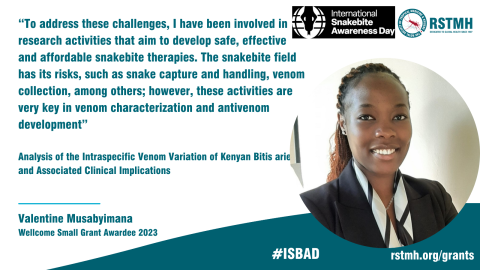
Project title: Analysis of the Intraspecific Venom Variation of Kenyan Bitis arietans and Associated Clinical Implications
Wellcome grant awardee 2023
What is your research’s focus?
I am interested in the immunology and pathophysiology of infectious and neglected tropical diseases, with focus on the prevention and treatment of these diseases through the development of effective and safe prophylactics and therapeutics. I am currently involved in snakebite research, focusing on venom characterization, development of novel therapeutics for snakebite envenoming, and antivenom quality control.
How did you first become interested in snakebite and its unique challenges?
I joined the snakebite field as a research student. My interest in this field grew when I properly understood the burden of snake bites in communities in Kenya and many other countries in the tropics and subtropics. For instance, there is deficit in availability of effective and safe antivenoms, as well as limited production of these therapeutic products in sub-Saharan Africa. To address these challenges, I have been involved in research activities that aim to develop safe, effective and affordable snakebite therapies. The snakebite field has its risks, such as snake capture and handling, venom collection, among others; however, these activities are very key in venom characterization and antivenom development.
How do you hope your research will impact snakebite patients?
Understanding the venom variation of one of the most medically important snake in Kenya, the puff adder and associated clinical implications will guide antivenom manufacturers in producing regionally effective antivenoms. This data will also guide clinicians to determine proper treatment and management strategies for snake bites, resulting in increased confidence in these therapeutic products from healthcare workers as well as snakebite patients. Having an effective antivenom and a confident healthcare workforce will significantly reduce snakebite-associated mortality and morbidity, contributing to improved public health.
Dr Ifeoluwapo Oyebola Asekun-Olarinmoye
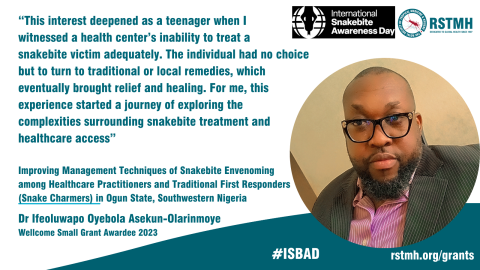
Project title: Improving Management Techniques of Snakebite Envenoming among Healthcare Practitioners and Traditional First Responders (Snake Charmers) in Ogun State, Southwestern Nigeria
Wellcome grant awardee 2023
What is your research’s focus?
Snakebite envenoming is a neglected public health problem with high mortality rates in Nigeria. Due to the presence of numerous rain forests wherein farming and dwelling settlements exist, inhabitants are endangered; especially when there are delays in seeking care or orthodox snakebite management is scarce. Knowledge transfer and better survival outcomes from snakebites can be achieved through collaborative efforts. Statistics on snakebite and its management in Ogun State is underreported, especially among traditional first responders. This knowledge gap will be assessed as a precursor to delivering a health education intervention among healthcare practitioners and their conventional counterparts in Ogun State.
How did you first become interested in snakebite and its unique challenges?
My interest in snakebite and its unique challenges was sparked by personal experiences during childhood when I had several close encounters with snakes. While these encounters initially filled me with fear, they also sparked curiosity about these creatures. This interest deepened as a teenager when I witnessed a health center’s inability to treat a snakebite victim adequately. The individual had no choice but to turn to traditional or local remedies, which eventually brought relief and healing. For me, this experience started a journey of exploring the complexities surrounding snakebite treatment and healthcare access.
How do you hope your research will impact snakebite patients?
I hope my research will lead to tangible improvements in the treatment and management of snakebites, especially in underserved regions where access to modern healthcare is limited. By highlighting the gaps in healthcare infrastructure and the reliance on traditional remedies, I aim to advocate for more accessible, affordable, and effective treatments, such as increased availability of antivenom. Additionally, my research could help inform policies that integrate both modern and traditional approaches, ensuring that snakebite patients receive timely and appropriate care. Ultimately, I hope this work will reduce the mortality and morbidity associated with snakebites, improving outcomes for affected communities.
Inika Sharma
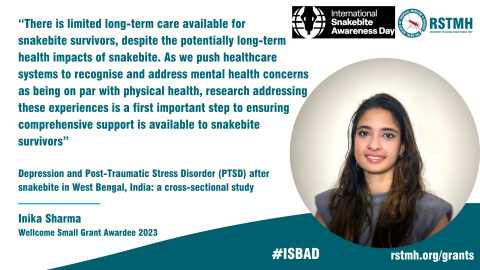
Project title: Depression and Post-Traumatic Stress Disorder (PTSD) after snakebite in West Bengal, India: a cross-sectional study
Wellcome grant awardee 2023
What is your research’s focus?
My research focuses on the prevalence of depression and PTSD among snakebite survivors. The study examines the experiences of snakebite survivors in the Sundarbans region, and their mental health up to one year after the snakebite incident.
How did you first become interested in snakebite and its unique challenges?
My supervisor had conducted a scoping review of research conducted on snakebite and mental health. Having come from a mental health background myself and being from India (a region with high incidence of snakebite), I was surprised to see the scarcity of primary research on the topic. There is limited long-term care available for snakebite survivors, despite the potentially long-term health impacts of snakebite. As we push healthcare systems to recognise and address mental health concerns as being on par with physical health, research addressing these experiences is a first important step to ensuring comprehensive support is available to snakebite survivors.
How do you hope your research will impact snakebite patients?
I hope my research can improve awareness to the lived immediate and long-term experiences of snakebite survivors and highlight the current gaps in the healthcare infrastructure for snakebite. If depression and PTSD prevalence rates are higher among snakebite survivors in this region, we hope to bring this to the attention of local health and state officials through the dissemination workshop we plan to conduct once the study is completed.
Fusco Luciano Sebastian
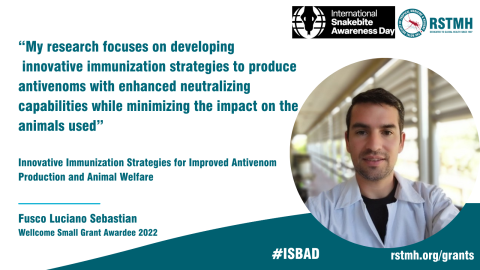
Project title: Innovative Immunization Strategies for Improved Antivenom Production and Animal Welfare
Wellcome grant awardee 2022
What is your research’s focus?
My research focuses on developing innovative immunization strategies to produce antivenoms with enhanced neutralizing capabilities while minimizing the impact on the animals used. We are exploring novel adjuvants like CpG-ODN, antigen slow-release green platforms such as Ascorbyl Palmitate (ASC16) and toxin inhibitors, like EDTA-Na2 and dispersed ASC16, to improve immunization efficiency and antibody quality.
How did you first become interested in snakebite and its unique challenges?
My interest in snakebite research stemmed from the complexity of venomous bites and their significant global health impact, particularly in underserved areas.
How do you hope your research will impact snakebite patients?
I hope my work leads to safer, more effective antivenoms and sets new standards for antivenom production.
Bikram Poudel
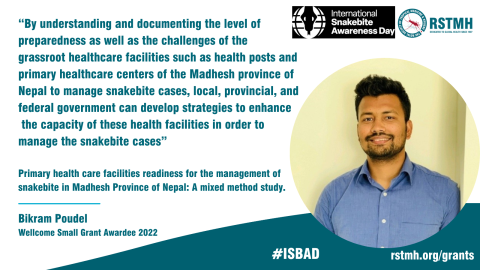
Project title: Primary health care facilities readiness for the management of snakebite in Madhesh Province of Nepal: A mixed method study
Wellcome grant awardee 2022
What is your research’s focus?
Addressing gaps in snakebite management in remote areas is vital for improving treatment outcomes. My study examines the readiness of primary health care centers in Madhesh Province, Nepal, to manage snakebite cases. It assesses their capabilities, resources, and challenges in delivering timely care. By identifying these factors, we aim to develop strategies that enhance snakebite treatment, ultimately reducing morbidity and mortality in this vulnerable region.
How did you first become interested in snakebite and its unique challenges?
My interest in snakebite management stems from personal experience. Growing up in southern Nepal, a region notorious for snakebites and other tropical diseases such as malaria and lymphatic filariasis, I witnessed firsthand the inadequacies in local healthcare facilities to manage these diseases. Although these health facilities provided access to basic primary care, these centers often lacked the resources to treat critical conditions like snakebite. The loss of many villagers including my aunt due to delayed treatment post snakebite motivated me to address this issue through my research.
How do you hope your research will impact snakebite patients?
By understanding and documenting the level of preparedness as well as the challenges of the grassroot healthcare facilities such as health posts and primary healthcare centers of the Madhesh province of Nepal to manage snakebite cases, local, provincial, and federal government can develop strategies to enhance the capacity of these health facilities in order to manage the snakebite cases. In doing so, snakebite patients can have easy and standard access to snakebite management services in this region.